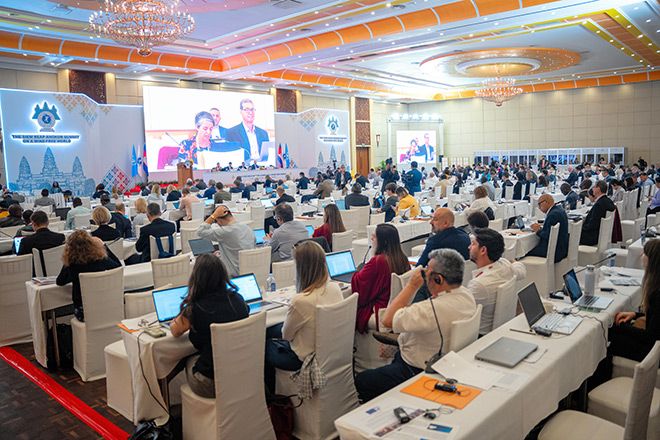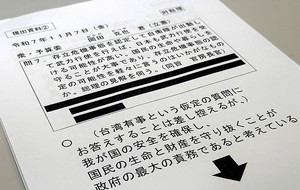January 3, 2025 at 14:43 JST
 The conference of the Siem Reap-Angkor Summit on a Mine-Free World in Siem Reap, Cambodia, on Nov. 27 (Toshiya Obu)
The conference of the Siem Reap-Angkor Summit on a Mine-Free World in Siem Reap, Cambodia, on Nov. 27 (Toshiya Obu)
Even wars have rules. Are we on the cusp of an era when we speak of this basic principle in the past tense?
Eighty years have passed since the last world war, yet the rules of international humanitarian law, painstakingly built up by the global community over time, are readily being violated, resulting in lost innocent lives.
We must stop this backward ticking of the clock.
BARRIERS TO MINE-FREE WORLD
In November last year, an international conference on the Anti-Personnel Mine Ban Treaty was held in Siem Reap, Cambodia, known for the World Heritage site Angkor Wat.
Outside the venue, a poignant demonstration unfolded. Landmine victims from various countries, their bodies bearing the scars of these inhumane weapons, lined up with placards. They were protesting the U.S. government’s announcement that it would supply landmines to Ukraine.
The United States is not a party to the international agreement that bans the use, stockpiling, production and transfer of anti-personnel landmines. But Ukraine is one, and it is not allowed to obtain or use these explosive devices that cannot distinguish between soldiers and civilians.
Russia, however, has flouted international laws and norms by invading Ukraine and employing a vast number of landmines, causing nearly 1,300 civilian casualties.
Finland, a neighbor of Russia and a party to the treaty, is considering reintroducing anti-personnel mines, according to its Ministry of Defense. In Latvia, a petition campaign calling for a withdrawal from the treaty has begun.
Anti-personnel mines continue to indiscriminately kill and injure civilians long after wars end. To address this ongoing threat, a treaty to completely ban these weapons was established in 1997, with civil society playing a significant role.
Notably, the International Campaign to Ban Landmines, a coalition of NGOs that advocated for the treaty and persuaded governments to sign it, was awarded the Nobel Peace Prize for its efforts.
Now, 164 countries and regions constituting around 80 percent of U.N. members have joined the treaty, and 94 of them have destroyed 55 million mines they had held.
The increase in treaty members generated a powerful wave of international public opinion, prodding major powers into action. Indeed, the United States declared a halt to the production of anti-personnel mines. Efforts to create new international norms aimed at saving lives have led to treaties banning cluster munitions and nuclear weapons.
There are fears this positive trend may be reversing.
Major countries that are not party to these treaties are using military force against member states, leading to a sense that “only the good suffer.”
The resurgence of an “our country first” mentality challenges efforts to uphold the universality of humanitarian principles.
DOUBLE STANDARDS BY MAJOR POWERS
The overbearing actions of major powers are not limited to Russia. The United States has also faced international criticism for its apparent double standards on these issues.
The war in the Gaza Strip, part of the larger Israeli-Palestinian conflict, provides a relevant example. After a surprise attack by Hamas, the Palestinian Islamist group that governs Gaza, resulted in the deaths of about 1,200 Israeli civilians, many countries affirmed Israel’s right to self-defense.
However, Israel’s military operation, aimed at destroying Hamas, has been disproportionately broad and violent, resulting in widespread civilian casualties.
The international community has increasingly condemned Israel’s actions, which appear to prioritize military objectives over the protection of civilian lives.
Nevertheless, Washington continued to defend its “special ally.”
At the U.N. Security Council, it vetoed resolutions calling for a cease-fire in Gaza five times and continued to supply weapons to Israel.
The International Criminal Court (ICC), which prosecutes war crimes and crimes against humanity, issued arrest warrants for Russian President Vladimir Putin and Israeli Prime Minister Benjamin Netanyahu.
U.S. President Joe Biden welcomed the ICC’s action against the Russian president, saying, “It’s justified.” But Biden condemned the arrest warrant for the Israeli leader as “outrageous.”
Neither the United States, Russia nor China are members of the ICC. Moscow has put out an arrest warrant for ICC President Tomoko Akane, and Washington has threatened economic sanctions against the court, located in The Hague.
The fact that the United States and Russia, despite their deeply adversarial relationship on numerous issues, find common ground in denouncing the ICC is not only bizarre--it’s also a deplorable setback for international justice.
It is hardly surprising that many emerging and developing countries are losing trust in the current international order.
After all, major powers themselves are ignoring and undermining the very norms that so many nations have painstakingly built over so many years.
BELIEVING IN VALUE OF U.N.
This month, former U.S. President Donald Trump, known for his signature America First agenda, is set to return to the White House.
During his first term, Trump announced the U.S. withdrawal from the World Health Organization (WHO) and actually pulled out of UNESCO and the international climate agreement, the Paris Accord.
He also advocates significant cuts to the U.N. peacekeeping budget and contributions to U.N. agencies, raising concerns about his administration’s accelerating disregard for the United Nations.
Japan has consistently championed a “U.N.-centered diplomacy” as a cornerstone of its foreign policy.
While the Security Council’s structure, with only its five permanent members holding veto power, is inherently unequal, the world body has undoubtedly served as a bedrock of international cooperation, playing a vital role in bridging the gap between developed and developing nations.
On the other hand, the Japan-U.S. alliance is also a linchpin of Japanese diplomacy.
However, despite the arrival of another U.S. administration questioning the value of the United Nations, framing the choice as a dichotomy between the United Nations and the United States, or between multilateralism and a bilateral focus, is likely unproductive.
U.N.-centered diplomacy, with its focus on peaceful conflict resolution, the rule of law, and the promotion of human rights and democracy, should be upheld as a fundamental principle. Now, more than ever, as the world risks losing its moral compass, it is crucial to champion this approach and share its values with as many nations as possible.
What is essential is not merely preaching these ideals but actively practicing them on the ground. Japan has long contributed to mine clearance in Cambodia, sharing its expertise across South America, Africa and, more recently, Ukraine.
By protecting human lives and contributing to reconstruction through these tangible actions, Japan needs to enhance global trust in the United Nations and the principles of humanitarianism it embodies.
--The Asahi Shimbun, Jan. 3




















A peek through the music industry’s curtain at the producers who harnessed social media to help their idols go global.
A series based on diplomatic documents declassified by Japan’s Foreign Ministry
Here is a collection of first-hand accounts by “hibakusha” atomic bomb survivors.
Cooking experts, chefs and others involved in the field of food introduce their special recipes intertwined with their paths in life.
A series about Japanese-Americans and their memories of World War II